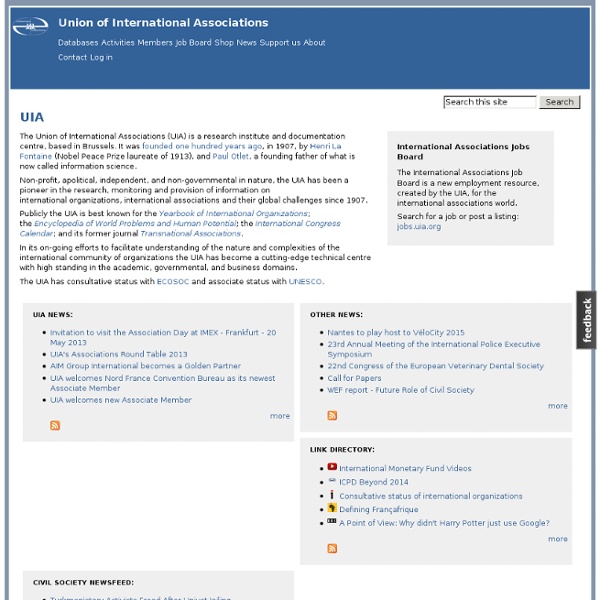



BigPictureSmallWorld: Home Law Library: IGOs & NGOs Research Guide This guide provides background information on IGOs and NGOs and features mega-lists of IGOs and NGOs for finding sources quickly. Introduction This guide provides you with brief background information on IGOs and NGOs and features mega-lists of IGOs and NGOs for finding sources quickly online. Print sources and other research guides are also included. If you have additional questions on IGOs & NGOs, please feel free to contact the Wolff Library reference desk at 202-662-4195 or by email: intlref@law.georgetown.edu. Definition of IGO & NGO What is an inter-governmental organization (IGO)? Generally a public or governmental organization created by treaty or agreement between states. What is a non-governmental organization (NGO)? An organization established by individuals or associations of individuals. Types of Documents Published by IGOs & NGOs Legal Nature of an IGO 1. 2. 3. 4. Researching IGOs & NGOs Online Online Search Tip Mega-Lists of IGOs & NGOs Print Sources Recent Books Aiding peace?
Center for Alternatives to Animal Testing - Johns Hopkins Bloomberg School of Public Health The Universal Declaration of Human Rights Whereas recognition of the inherent dignity and of the equal and inalienable rights of all members of the human family is the foundation of freedom, justice and peace in the world, Whereas disregard and contempt for human rights have resulted in barbarous acts which have outraged the conscience of mankind, and the advent of a world in which human beings shall enjoy freedom of speech and belief and freedom from fear and want has been proclaimed as the highest aspiration of the common people, Whereas it is essential, if man is not to be compelled to have recourse, as a last resort, to rebellion against tyranny and oppression, that human rights should be protected by the rule of law, Whereas it is essential to promote the development of friendly relations between nations, Whereas Member States have pledged themselves to achieve, in co-operation with the United Nations, the promotion of universal respect for and observance of human rights and fundamental freedoms, Article 1. Article 2. Article 3.
Global change Global change refers to planetary-scale changes in the Earth system. The system consists of the land, oceans, atmosphere, poles, life, the planet’s natural cycles and deep Earth processes. These constituent parts influence one another. The Earth system now includes human society, so global change also refers to large-scale changes in society.[1] More completely, the term “global change” encompasses: population, climate, the economy, resource use, energy development, transport, communication, land use and land cover, urbanization, globalization, atmospheric circulation, ocean circulation, the carbon cycle, the nitrogen cycle, the water cycle and other cycles, sea ice loss, sea-level rise, food webs, biological diversity, pollution, health, over fishing, and more.[2] History of global-change research[edit] IGBP, WCRP and a third programme, the International Human Dimensions Programme (IHDP, founded in 1996), spearheaded a landmark science conference held in Amsterdam in 2001. See also[edit]
Strategic Thinking Approaching Business with Systems Thinking Businesses promote and sell products and services, which includes solutions to a problem or benefit of a product. In a lot of businesses, expertise is an key capability that leads to the ability to provide optimum service. That is why some companies create functional teams within their corporate structure to ensure that expert service is provided. The team of workers should be strategically placed so that their expertise can be appropriately utilized. Another reason is to make each employee accountable and responsible for their specific role. Why You Should Embrace Systems Thinking When a business uses a systems thinking approach to doing business, it makes the system more efficient and cost-effective. Systems thinking combined with human interaction with customers is exemplary of a wide range of things working efficiently for the same goal. Working together for a common goal is pretty much what systems thinking is about.
New Civilization Network UNA-USA's Model UN Homepage | MUN Learn how UNA-USA connects Americans with the United Nations through local Chapters, grassroots advocacy, and education. Advocacy AgendaFind a ChapterModel UNHuman RightsUNA-USA/Seton Hall Study ProgramUpcoming Events Members receive access to a range of exclusive benefits such as events at the UN and across the United States, as well as opportunities to advocate, host Model UN conferences, and connect young professionals to UN experts. Join UNA-USAFor MembersModel UN ResourcesAdvocacy ResourcesYoung ProfessionalsStudent AllianceCouncil of Organizations Learn how the UN is making an impact and how UNA-USA Chapters are sharing the UN with communities around the U.S. through our online news magazines The InterDependent and World Bulletin. The InterDependentFrom the Executive DirectorWorld BulletinUN DispatchNews & Publications
transitioner.org : Global challenges All pages in TheTransitioner that have ' Global Challenge ' in their title are part of an organized structure whose aim is to cover global challenges in a collective intelligence way through our collaborative spage TheTransitioner. The initial content has been provided by OSS.Net, Inc., a Virginia for-profit corporation, as a contribution to the Earth Intelligence Network, a Virginia non-profit that has applied for 501c3 (tax exempt) status. It is our hope that others will adopt this web site and these wikis to make their own intellectual contributions. No one owns this--it is a gift intended to inspire organized reciprocal altruism. As soon as possible, we hope to create a virtual EarthBudget totalling US$1 trillion a year. - Charitable Foundations giving $1 trillion a year to threat reduction and policy harmonization programs - Corporations able to understand that going green and practicing fair trade is profitable and sustainable. This is an open letter. Advanced Self-Study
SystemsWiki